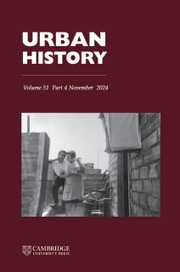Crossref Citations
This article has been cited by the following publications. This list is generated based on data provided by Crossref.
Waddington, Keir
2003.
‘Dead Meat’ Dramas: Diseased Meat and the Public's Health.
History Compass,
Vol. 1,
Issue. 1,
FRENCH, CHRISTOPHER
2004.
INFANT MORTALITY IN ASYLUM ROAD,KINGSTON UPON THAMES,1872-1911: AN EXERCISE IN MICROHISTORY.
Family & Community History,
Vol. 7,
Issue. 2,
p.
141.
Rock, Melanie
Mykhalovskiy, Eric
and
Schlich, Thomas
2007.
People, other animals and health knowledges: Towards a research agenda.
Social Science & Medicine,
Vol. 64,
Issue. 9,
p.
1970.
Pemberton, Neil
and
Worboys, Michael
2007.
Mad Dogs and Englishmen.
p.
1.
Rock, Melanie
and
Babinec, Patricia
2008.
Diabetes in People, Cats, and Dogs: Biomedicine and Manifold Ontologies.
Medical Anthropology,
Vol. 27,
Issue. 4,
p.
324.
Atkins, Peter
2008.
Fear of animal foods: A century of zoonotics.
Appetite,
Vol. 51,
Issue. 1,
p.
18.
Singer, Merrill
Herring, D. Ann
Littleton, Judith
and
Rock, Melanie
2011.
A Companion to Medical Anthropology.
p.
159.
Enticott, Gareth
Donaldson, Andrew
Lowe, Philip
Power, Megan
Proctor, Amy
and
Wilkinson, Katy
2011.
The changing role of veterinary expertise in the food chain.
Philosophical Transactions of the Royal Society B: Biological Sciences,
Vol. 366,
Issue. 1573,
p.
1955.
Rock, Melanie
2012.
CONNECTING LIVES: REFLECTIONS ON A SYNDEMIC APPROACH TO PREVENTION INVOLVING RESEARCH ON HOW PEOPLE RELATE TO PETS.
Annals of Anthropological Practice,
Vol. 36,
Issue. 2,
p.
312.
THELLE, MIKKEL
2018.
The Meat City: urban space and provision in industrial Copenhagen, 1880–1914.
Urban History,
Vol. 45,
Issue. 2,
p.
233.
Thomas, Richard
Holmes, Matilda
Morris, James
and
Abrehart, Emily
2018.
‘The brede of good & strong Horsis’: zooarchaeological evidence for size change in horses from early modern London.
Post-Medieval Archaeology,
Vol. 52,
Issue. 2,
p.
224.
LÓPEZ-DURÁN, FABIOLA
and
MOORE, NIKKI
2018.
Meat-milieu: medicalization, aestheticization and productivity in Buenos Aires and its Pampas, 1868–1950.
Urban History,
Vol. 45,
Issue. 2,
p.
253.
Li, Chien-hui
2019.
Mobilizing Traditions in the First Wave of the British Animal Defense Movement.
p.
159.
Abraham, Santhosh
and
Varughese, Susy
2024.
Madras
Kraals
, animal labour and Veterinary Corps: colonising wild elephants in British South India
.
Labor History,
Vol. 65,
Issue. 2,
p.
240.


